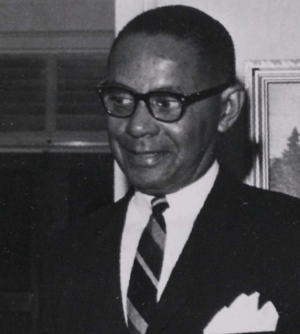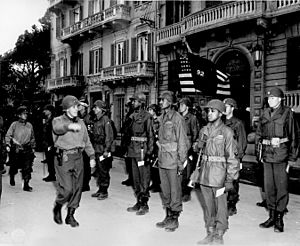Bert Cumby facts for kids
Quick facts for kids
Bert Cumby
|
|
|---|---|

Bert Cumby pictured in 1965 at an embassy reception in Bangkok
|
|
| Born | January 7, 1912 Corinth, Mississippi, United States |
| Died | September 8, 1981 (aged 69) Washington, D.C., United States |
| Allegiance | United States of America |
| Branch | |
| Years of service | 1942–1961 |
| Rank | Lieutenant colonel |
| Unit | 92nd Infantry Division (Colored) Military Intelligence Corps |
| Battles/wars | World War II Korean War |
| Awards | |
| Spouse(s) | Esther Cumby |
| Children | Bert, Jr. Frank (adopted) |
| Other work | |
Bert Cumby (January 7, 1912 – September 8, 1981) was an important officer in the United States Army who worked in military intelligence. He helped lead the debriefing of American prisoners of war (POWs) after the Korean War. In 1956, he spoke to a special committee in the United States Senate. He shared his concerns about a plan he believed was happening to influence American POWs. He thought this plan was meant to help China join the United Nations and become friends with the U.S.
Contents
Early Life and Education
Bert Cumby was born in Corinth, Mississippi. When he was a teenager, he met Robert Church Jr.. Church was a leader at a bank and also on the national board of the NAACP.
Cumby went to Fisk University. After college, he worked as a funeral director. In the 1930s, he often spoke and wrote about politics. After a speech he gave to raise money for the NAACP, a newspaper called him an amazing speaker.
Joining the Army
In 1942, Cumby decided to join the United States Army. He said he wanted to fight for his country. He was sent to Europe during World War II. He fought in Italy as a leader of an infantry platoon with the 92nd Infantry Division (Colored).
Military Career
Working in Military Intelligence
After World War II, Bert Cumby started working in military intelligence. This means he gathered and analyzed information for the army. He played a key role during the Korean War. He helped interview American prisoners of war (POWs) who were returning home. This happened after an event called Operation Big Switch, where many prisoners were exchanged.
Later, he spoke to the United States Senate. He answered questions about whether American POWs had been influenced by their captors. He said that about one-third of the American POWs had cooperated with their North Korean and Chinese captors. He believed this was often due to efforts to change their thinking. He said that prisoners had to attend classes on political ideas. Some prisoners chose to continue these lessons.
Cumby believed that the goal was for China to get its seat in the United Nations. He also thought they wanted to become friends with the United States. He said that influencing the American POWs was meant to create people who would support these goals back in the U.S.
He also helped question a former POW named Claude Batchelor. Cumby also gave evidence in a trial against a former POW accused of working with the enemy. To keep his identity a secret, he appeared in court with his face hidden and was called "Mr. X."
Later in his career, he taught at the United States Army Intelligence Center. He also became the head of research for the Military Intelligence Corps.
Joining the U.S. Foreign Service
Bert Cumby retired from the U.S. Army in 1961. He had reached the rank of lieutenant colonel. After leaving the army, he joined the United States Foreign Service. This meant he worked for the U.S. government in other countries. He was stationed in Thailand and Spain.
Personal Life
Family and Retirement
Bert Cumby was married to Esther Cumby. They had one biological son, Bert Jr. They also adopted a teenage boy from Luxembourg. This adoption was helped by Perle Mesta, who was the U.S. Ambassador to Luxembourg.
Esther Cumby was a high school friend of Agatha Davis. Agatha was the wife of General Benjamin O. Davis Jr.. General Davis described Bert Cumby as a "good friend" in his autobiography. Esther Cumby was a schoolteacher. Early in her career, she chose to teach in a segregated school.
After his final retirement, Cumby stayed involved with the Association of Former Intelligence Officers. He lived in Silver Spring, Maryland. In 1976, he helped with the reelection campaign of United States Senator John Glenn Beall Jr..
Bert Cumby passed away from cancer at Walter Reed Army Medical Center when he was 69 years old.
See also
- Project MKUltra
- Robert Jay Lifton
- The Manchurian Candidate
 | Sharif Bey |
 | Hale Woodruff |
 | Richmond Barthé |
 | Purvis Young |


